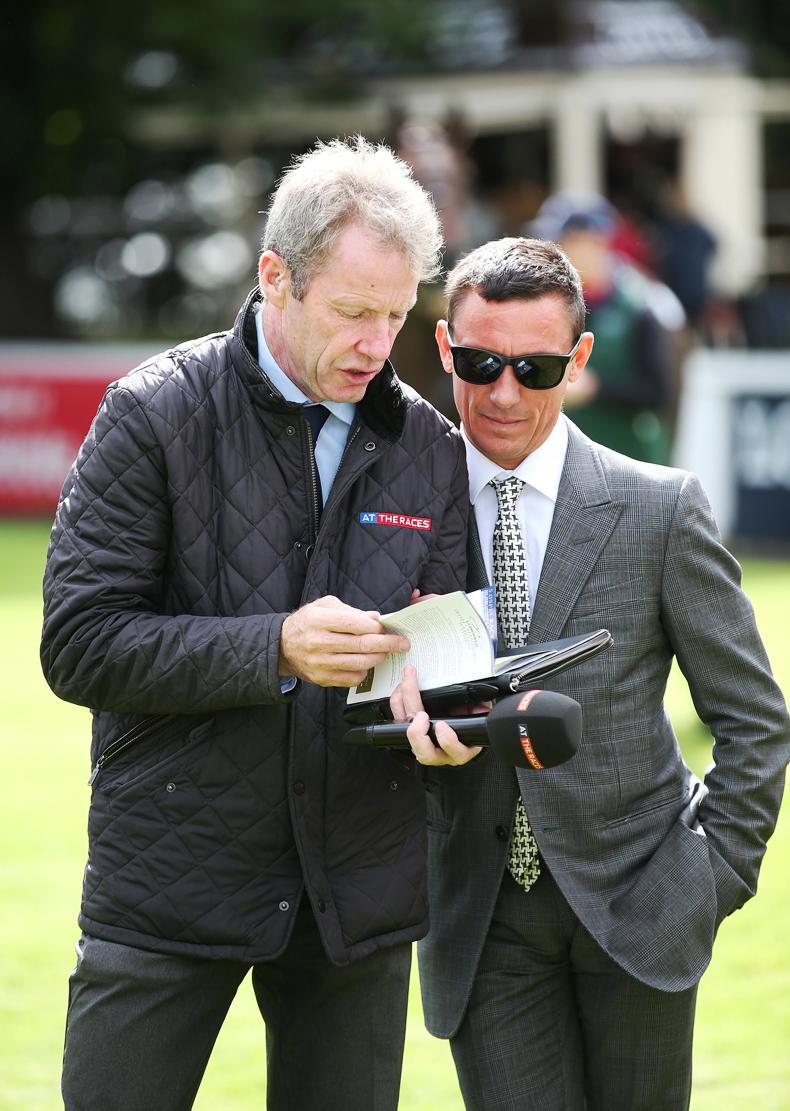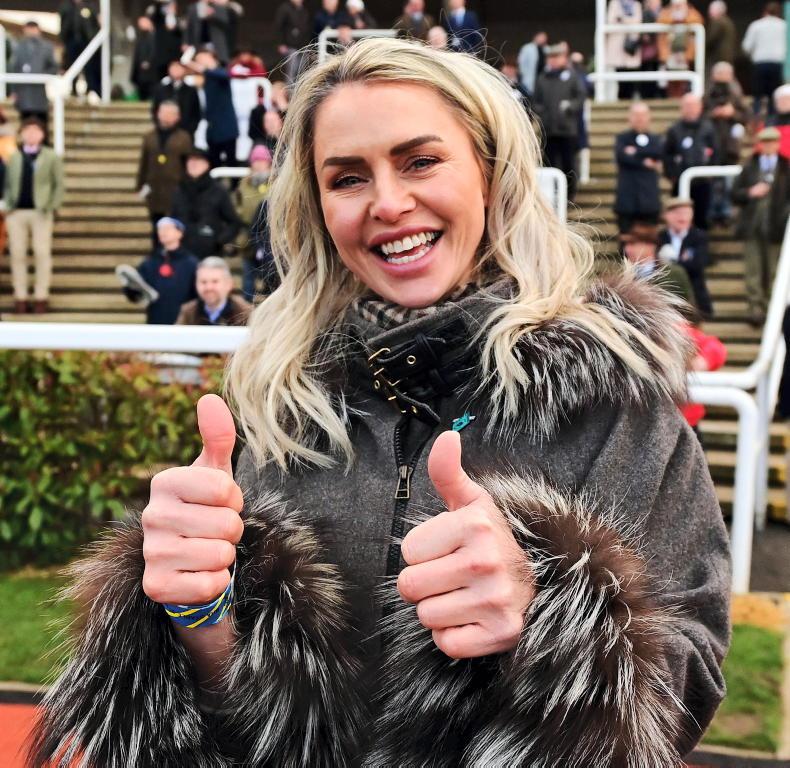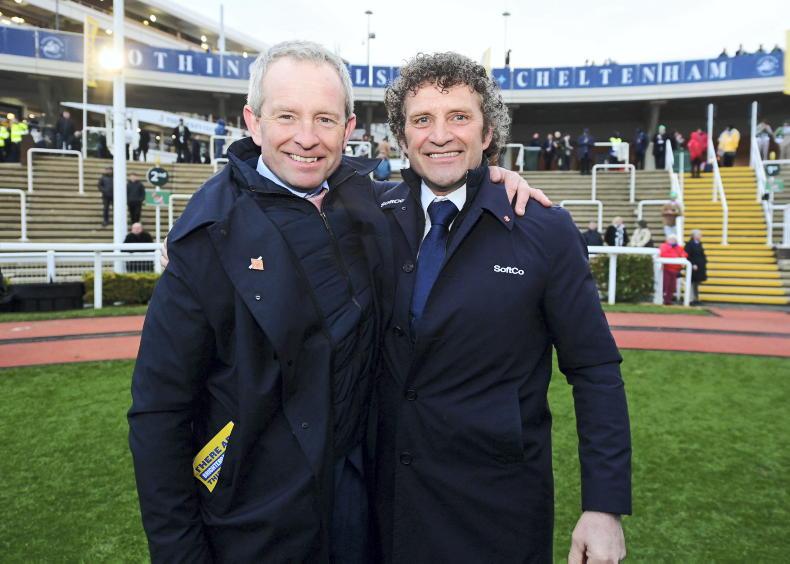THE Cheltenham Festival is now a much different experience than it once was for Mick Fitzgerald, but that doesn’t diminish his enthusiasm for the peerless four days in the National Hunt calendar.
As one of the most successful jump jockeys of all time, Fitzgerald would previously enter the gates of Cheltenham Racecourse, point himself towards the weighing room and take a right to sit alongside his band of brothers, gearing up to tackle one of sport’s greatest amphitheatres.
Nowadays, the 52-year-old walks past that sacred space for riders when he arrives at Prestbury Park. The adrenaline still flows, though, when he reaches the parade ring’s ITV Racing podium, where he has made his mark as a leading pundit for a number years since his riding career ended in 2008.
They say in life that change is inevitable but growth is optional, and Fitzgerald in his second career has developed into a most accessible communicator for the sport on terrestrial television.
“I get such a kick out of my work now because there’s nothing quite like live television,” says the former Grand National-winning jockey, who also is a key figure in Sky Sports Racing’s coverage.
“If you’re not excited at this time of year, you’ll never be excited. The great thing is that I know what it feels like to walk out onto the turf riding the favourite in the Supreme. I know what it feels like when it goes wrong, and I also know what it’s like to win a big race on a fancied horse. I’ve seen both sides so I can tell you what those lads are going through. When you’re a mere mortal like I am now, you don’t experience those highs and lows.
“Still to this day, I get choked up when thinking about returning to the winner’s enclosure after riding the winner of the Cheltenham Gold Cup [aboard See More Business in 1999]. That was a lifetime ambition for me, and to achieve it - standing up in the irons and punching the air - there is no greater feeling.”
Second career
A.P. McCoy, in his retirement, said he believes sportspeople are potentially the only people on earth who die twice - once when retiring and secondly at the time of their death.
Given the magnitude of highs in Fitzgerald’s glittering riding career, was it hard to accept that he would never feel the same buzz of partnering a Cheltenham Festival winner again?

“It is very hard,” he says. “I don’t mind admitting now, and I’ve said it before, but the first year that I went back to Cheltenham after calling time on my career was when Punjabi won the Champion Hurdle, and it really hurt. The Champion Hurdle was probably the only big one there that I was missing.
“I can remember getting back to my car and breaking down in tears. It hit me then that I’ll never get to win a Champion Hurdle or experience that thrill of walking into the winner’s enclosure at Cheltenham ever again. When it hits home that you’re just another Joe at Cheltenham, it is difficult.
“You go from being somebody who experiences Cheltenham in a different way to everyone else, to having to accept that a huge part of you is gone. You have to come to terms with that.
“I love racing, and I love what I do now, though. It’s important that I try to put as much into it as I can. Yes, what I do now is not riding winners or punching the air in the winner’s enclosure at the big meetings, but I’d like to think I have a role to play. I try to do it to the best of my ability.”
Fitzgerald certainly has been there and done that when it comes to winning the Festival’s biggest prizes. As well as the Blue Riband event, his list of wins at the meeting includes marquee races such as the Queen Mother Champion Chase on Call Equiname (1999), the Stayers’ Hurdle on Bacchanal (2000), the Arkle with Tiutchev (2000), the RSA Chase on Trabolgan (2005) and the Ryanair Chase with Fondmort (2006).
Coral Cup coup
The son of parents from Killorglin, Co Kerry and Boolavogue, Co Wexford was also a part of one of the most memorable gambles at the Cheltenham Festival this century when Xenophon hosed up in the Coral Cup. Next month’s Festival marks 20 years since that ready success for the Tony Martin-trained favourite.
On the ease at which Xenophon travelled behind the leaders approaching the second last flight, the 14-time Cheltenham Festival-winning rider says: “It’s a bit like driving a Ferrari and you’re waiting at traffic lights looking at two Minis. You kind of know what the result will be when the lights go green, and that’s how it feels when you ride a horse like Xenophon.
“I rode him to win the Pierse Hurdle on his previous start and Nicky had others in the mix for the Coral Cup. I remember begging Nicky to let me ride Xenophon. He wasn’t sure about it, but I had never before asked him before to ride another horse. I told him he would not be beaten, and we didn’t end up having a runner in the race.
“It was a brilliant feeling to win on a horse who was punted like he was, because you’re walking back into the winner’s enclosure knowing you’ve made the majority of people at the racecourse happy. It’s an amazing buzz. Tony is a brilliant fella and an excellent trainer.”
When asked which rider he would choose to partner a hypothetical mount at this year’s Cheltenham Festival, Fitzgerald does not hesitate to single out one jockey from the current weighing room crop.
“Davy Russell would be the first name on my sheet,” he says.
“Some guys just come alive on days like Cheltenham, and that’s Davy. Nowadays he’d have lost the race [due to interference], but nobody else would have won the Gold Cup on Lord Windermere except him. He kept telling himself it would happen and eventually it did.”
Russell made a spectacular u-turn in January from his brief retirement, having previously overcome serious back and neck injuries.
Given Fitzgerald’s career-ending injury in the 2008 Grand National came through breaking four vertebrae in his neck - two of which penetrating his spinal cord - what did he make of Russell’s decision to return and deputise for the sidelined Jack Kennedy?
“You don’t turn down the chance to ride the quality of horses available in Gordon Elliott’s - especially when it was so soon after he’d retired,” says Fitzgerald.
“It’s tough for the younger lads hoping this would be their chance but I haven’t heard anyone say he hasn’t been riding as well as before since returning. You don’t have to ask Davy Russell twice.”

‘Gentleman’ Henderson
Fitzgerald’s rich association with Nicky Henderson has endured for many years beyond his starring role as the legendary trainer’s stable jockey. He knows the Seven Barrows maestro better than most and singles out one quality when asked what makes Henderson stand out from the pack.
“He’s a gentleman. It wouldn’t matter if he was selling fruit on a stall, he’d be the same man. I’ve learned an awful lot about life from him,” says Fitzgerald.
“I know he gets a bit of stick at times but he cares infinitely about his horses, and it hurts him when things go wrong. He takes it personally when a horse gets injured and I know how much it still hurts him about running Altior against Cyrname at Ascot. He feels responsible that the horse was never the same after it, in his eyes.
“He knew the flak he’d get for pulling Constitution Hill out of Ascot this season but it didn’t matter to him. His number one priority is his horse and owner, and he’ll take all the flak in the world if he does his job properly. He will not be ruled by social media and keyboard warriors alike. That has never changed with him.”
Fitzgerald described him and wife Chloe being given Altior to look after in his retirement as a “real privilege” following the chaser’s spectacular career with Henderson.
There were massively worrying times for the entire family when Pat and Christopher Pugh’s 13-year-old was hit with a serious colic scare last month. However, the star two-miler has now improved considerably to make a remarkable recovery.
“You’re actually calling me just as I’m out on the lawn grazing Altior,” Fitzgerald beams down the phone.
“He’s in great form. It’s amazing that he’s as good as he is. Honestly, on the Sunday after he had a second surgery I thought we were going to struggle. He fought hard and is A1 now, which is incredible.
“The one thing about the whole episode is how Pat and Christopher Pugh didn’t care how much anything cost, they just wanted to do everything in their power to give the horse a fighting chance. They wanted to try everything that could be done, and that was the deciding factor in the end.
“Nicky did his bit too. Altior was in two sets of vets. They did a great job in Lambourn with the first surgery that effectively saved his life, and then Kate McGovern, a specialist in colic and surgery aftercare, did an amazing job looking after him. Everybody did their bit and it made the difference. He’s a gent of a horse to deal with a home. Now, he can be a bit of a hooligan when he’s being ridden out because he still thinks he’s the champ - he likes to strut his stuff.”
Whipping up a storm
Among the many hats that Fitzgerald wears nowadays, he helps to nurture the talents of a number of young riders in his role as a jockey coach.
He is well placed to gauge the temperature among jockeys as to their concerns over new hefty penalties for whip-rule breaches.
“For sure you can feel the worry among them,” says Fitzgerald. “They understand what’s at stake. You have to appreciate that if these people don’t ride, they can’t earn. If they lose rides on good horses they might never get them back.
“I feel it was unnecessary to bring these rules in before Cheltenham because I think it’s an own goal in terms of negative publicity for the sport. I think they should have delayed it. To me, if it looks bad it is bad. That should be the judgement on these things. You shouldn’t need a freeze-frame, VAR-style system to see if someone has gone over helmet height.
“Everybody has got a different style of riding. If you see someone using their whip 10 or 11 times, you just can’t do that. But a hand raised a fraction above helmet height leading to someone getting days is silly.”
Fitzgerald is passionate when it comes to his genuine affection towards the animals who have helped to shape his career, both in and out of the saddle.
Sir Mark Prescott has spoken out about urban societies supposedly lacking an understanding of the working animal - describing it as racing’s greatest challenge - and Fitzgerald is adamant that more can be done to introduce such individuals to horses.
“We do have a responsibility to be aware of the outside world, because this world is changing,” he says.
“The stuff you could say 10 years ago, you can’t say now. The same goes for programmes on TV a decade ago. Why is that? It’s because it’s not acceptable anymore. There are some things we have to realise that some people don’t like, but I think we’ve got a lot to shout about in our sport and we don’t need negative press. Introducing the new whip rules at this time is bringing in plenty of negativity around us.
“Very often in Ireland, there will be people who at some stage in their lives have been up close, touched and seen horses in the flesh, but that’s not always the case in the UK. People in a lot of British cities have never seen a horse, let alone touch them. I think we have a responsibility to get as many people interacting with the animal as we can.
“Everything I have in my life, I owe to horses. If you’re lucky enough to spend your life working for them, it’s never really work. People deserve the opportunity to experience how they are magnificent creatures. I think it’s our duty.”




 This is a subscriber-only article
This is a subscriber-only article
 It looks like you're browsing in private mode
It looks like you're browsing in private mode














SHARING OPTIONS: